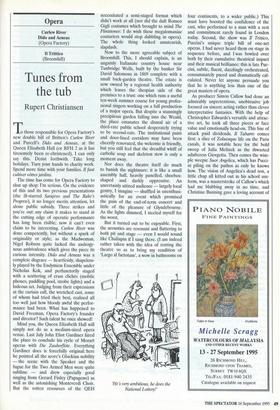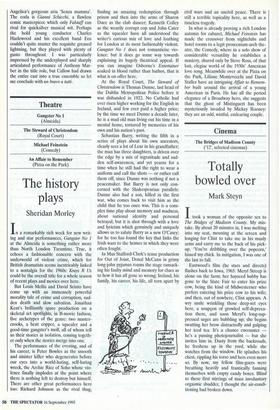Opera
Curlew River Dido and Aeneas (Opera Factory) II Trittico (Broomhill)
Tunes from the tub
Rupert Christiansen
those responsible for Opera Factory's new double bill of Britten's Curlew River and Purcell's Dido and Aeneas, at the Queen Elizabeth Hall (or RFH 2 as it has tiresomely been re-christened), I can only say this. Desist forthwith. Take long holidays. Turn your hands to charity work. Spend more time with your families. Il faut cultiver Owes jardins.
The time has come for Opera Factory to shut up shop: I'm serious. On the evidence of this and its two previous presentations (the ill-starred Sarajevo and The Rake's Progress), it no longer merits attention, let alone public subsidy. Three strikes and you're out: any claim it makes to stand at the cutting edge of operatic performance has long been risible; now it can't even claim to be interesting. Curlew River was done competently, but without a spark of originality or style; as the Madwoman, Nigel Robson quite lacked the androgy- nous ambivalence which gives the piece its curious intensity. Dido and Aeneas was a complete disgrace — heartlessly, shapeless- ly played by the Endymion Ensemble under Nicholas Kok, and perfunctorily staged with a scattering of crass clichés (mobile phones, paddling pool, strobe lights) and a hideous set. Judging from their expressions at the curtain call, the wretched cast, some of whom had tried their best, realised all too well just how bloody awful the perfor- mance had been. What has happened to David Freeman, Opera Factory's founder and director? Such talent he once showed!
Mind you, the Queen Elizabeth Hall will simply not do as a medium-sized opera venue. Last July John Eliot Gardiner hired the place to conclude his cycle of Mozart operas with Die Zauberflate. Everything Gardiner does is forcefully original: here he pointed all the score's Gluckian nobility — the scene with the Speaker and the fugue for the Two Armed Men were quite sublime — and drew especially good singing from Gerard Finley (Papageno) as well as the astonishing Monteverdi Choir. But the rotten resources of the QEH necessitated a semi-staged format which didn't work at all (nor did the daft Romeo Gigli costumes which brought to mind The Flintstones: I do wish these megalomaniac couturiers would stop dabbling in opera). The whole thing looked amateurish, slapdash.
Now to the more agreeable subject of Broomhill. This, I should explain, is an ungainly Italianate country house near Tunbridge Wells, built by the banker Sir David Salomons in 1869 complete with a small back-garden theatre. The estate is now owned by a regional health authority which leases the thespian side of the premises to a trust: one which runs a useful ten-week summer course for young profes- sional singers working on a full production of a major opera. But despite a stunningly precipitous garden falling into the Weald, the place emanates the dismal air of a third-rate public school desperately trying to be second-rate. The institutional paint and door-lined corridors may have been cheerily renovated, the welcome is friendly, but you still feel that the dreadful whiff of carbolic soap and skeleton stew is only a moment away.
Nor does the theatre itself do much to banish the nightmare: it is like a small assembly hall, heavily panelled, shoebox- shaped and darkly oppressive. An uncertainly attired audience — largely local gentry, I imagine — shuffled in unenthusi- astically for an event which promised the pain of the end-of-term concert and little of the pleasure of Glyndeboume. As the lights dimmed, I steeled myself for the worst.
But it turned out to be enjoyable. First, the acoustics are resonant and flattering to both pit and stage — even I would sound like Chaliapin if I sang there. (I am indeed rather taken with the idea of renting the theatre so as to bring my rendition of `Largo al factotum', a wow in bathrooms on `He's very ambitious, he does the National Lottery!' four continents, to a wider public.) This must have boosted the confidence of the cast, who performed to a man with a zest and commitment rarely found in London today. Second, the show was II Trittico, Puccini's unique triple bill of one-act operas. I had never heard them on stage in sequence before, and I was bowled over both by their cumulative theatrical impact and their musical brilliance: this is late Puc- cini, subtle, fluent, dazzlingly orchestrated, consummately paced and dramatically cal- culated. Never let anyone persuade you that he is anything less than one of the great masters of opera.
As producer Simon Callow had done an admirably unpretentious, unobtrusive job focused on sincere acting rather than clever interpretative fantasies. With the help of Christopher Edwards's versatile and attrac- tive set, he took all three pieces at face value and emotionally head-on. This line of attack paid dividends. R Tabarro comes first: a slice of Zolaesque life on the Paris canals, it was notable here for the bold sweep of Julia Melinek as the thwarted adulteress Giorgetta. Then comes the wim- ple weepie Suor Angelica, which has Pucci- ni piling on the pathos as only he knows how. The vision of Angelica's dead son, a little chap all kitted out in his school uni- form, was a masterstroke of Callow's which had me blubbing away in no time, and Christine Bunning gave a loving account of Angelica's gorgeous aria `Senza mamma'. The coda is Gianni Schicchi, a flawless comic masterpiece which only Falstaff can rival for quicksilver musical wit. Perhaps the bold young conductor Charles Hazlewood and his excellent band Eos couldn't quite muster the requisite greased lightning, but they played with plenty of gusto throughout. I was particularly impressed by the underplayed and sharply articulated performance of Anthony Mar- ber in the title role, but Callow had drawn the entire cast into a true ensemble so let me conclude with un bravo a tutti.



































































 Previous page
Previous page